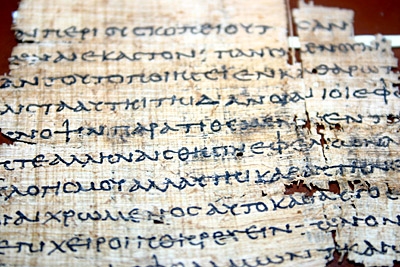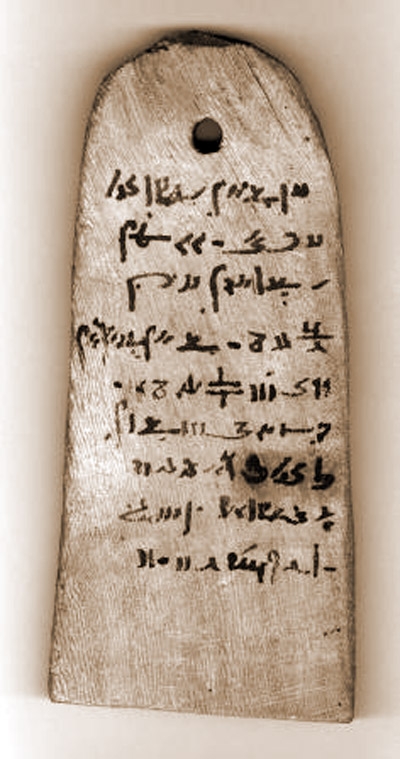Papyrology
The Leiden Papyrological Institute is the only papyrological institute in the Netherlands, and one of the few institutes in the world where study of Greek and Demotic Egyptian is combined. This is reflected in both teaching and research. Members of the Institute are active in publishing texts from various collections around the world, including the collection of the Institute itself.
Documents are not seen as texts per se, but as objects in context. They are always edited with extensive commentary, detailing the various aspects of each text in the context of the world of Greek and Roman Egypt. Many texts belong to archives: groups of documents assembled in ancient times for personal or official purposes. The study of texts in their archival context is one of the specialities of the Leiden Institute.
It is not hard to imagine the difficulties that can arise when one tries to read a text that has been buried in the sand for two thousand years. Mistakes in reading and interpretation are bound to be made. Therefore, revision and correction of texts form part and parcel of the papyrological trade. The Berichtigungsliste der griechischen Papyrusurkunden aus Ägypten, edited by the Institute, aims to offer a critical list of all corrections that are proposed for published Greek papyrus documents. The Demotic Berichtigungsliste also originates from Leiden.
Papyrology

Papyrology is the study of ancient texts from Egypt written on papyrus as well as potsherds, wooden tablets, etc. The dry sands of Egypt have preserved hundreds of thousands of these texts. The writing material was made from the stem of the Egyptian papyrus plant. Papyrus was used for writing from about 2500 BC until 1000 AD. The greater part of the papyri, however, comes from the period when Egypt was first a Hellenistic kingdom ruled by the Ptolemies (332-30 BC), and later part of the Roman and Byzantine empires (BC 30-ca. 300 AD and 300-640 AD respectively). During this entire period, Greek was the administrative language of Egypt, in which the majority of documents was written, although texts were also written in Egyptian and occasionally in other languages. Documentary papyri offer evidence that is unique for the ancient world. They deal with every aspect of life and offer a level of detail not available from other sources. Texts range from royal ordinances to personal letters, from contracts to invitations. They are of importance for the study of language, law, administration, economics, social relationships and religion. In recent years, scholars have discovered their potential for the study of subjects such as agriculture, demography, literacy, gender relations and ethnicity. Electronic resources have also had an impact on the way papyrological study is conducted.
The Leiden Papyrological Institute

The Leiden Papyrological Institute is the only papyrological institute in the Netherlands, and one of the few institutes in the world where study of Greek and Demotic Egyptian is combined. This is reflected in both teaching and research.
Members of the Institute are active in publishing texts from various collections around the world, including the collection of the Institute itself. Documents are not seen as texts per se, but as objects in context. They are always edited with extensive commentary, detailing the various aspects of each text in the context of the world of Greek and Roman Egypt.
Many texts belong to archives: groups of documents assembled in ancient times for personal or official purposes. The study of texts in their archival context is one of the specialities of the Leiden Institute.
It is not hard to imagine the difficulties that can arise when one tries to read a text that has been buried in the sand for two thousand years. Mistakes in reading and interpretation are bound to be made. Therefore, revision and correction of texts form part and parcel of the papyrological trade. The Berichtigungsliste der griechischen Papyrusurkunden aus Ägypten, edited by the Institute, aims to offer a critical list of all corrections that are proposed for published Greek papyrus documents. A Demotic Berichtigungsliste covering the literature of the past century has just been published.
The Institute within the University
The Papyrological Institute is housed on the first floor in the University Library of Leiden University. Here, both teaching and research take place. Next to a representative collection of papyri the Institute houses an excellent research library of all extant papyrus editions and much secondary literature. The interdisciplinary approach of the Institute is reflected in its institutional position. As of January 2000 the Institute joined the Faculty of Arts, and it now forms part of the Leiden Institute of Area Studies (LIAS), School of Middle Eastern Studies (SMES). Within the Faculty of Arts, the Institute is tied to the Departments of Classics, Egyptology and History where several introductory and advanced courses in Greek and Demotic papyrology are offered. Within the Faculty of Law, to which the Institute previously belonged, the course 'Ancient Egyptian Law' continues to be taught.
Leiden University has a rich history in the domain of Papyrology. In 2014 the Papyrology+ Group was founded, a collaboration of all Leiden scholars studying (Abnormal) Hieratic, Demotic, Aramaic, Greek, Latin, Coptic, and Arabic papyri from a socio-historical, economic and linguistic perspective. Papyrology+ aims to explore new opportunities and directions in the study of ancient papyri and to give greater publicity to Leiden Papyrology in general.
Courses in English
Some of the courses offered by the Papyrological Institute are taught in English, other courses can be taught in English on demand.
Contact
Address:
Papyrological Institute
Witte Singel 27 (University Library)
2311 BG Leiden, The Netherlands
Telephone: +31 71 527 2906
Hours: Monday-Friday 9 AM till 5 PM
Contact:
Cisca Hoogendijk


